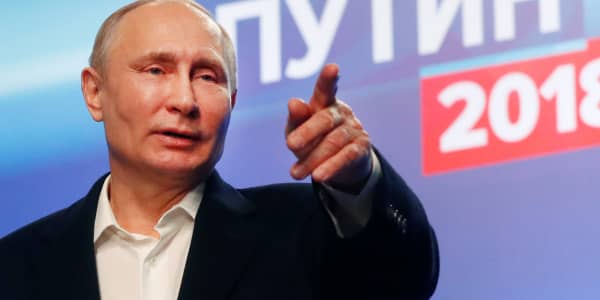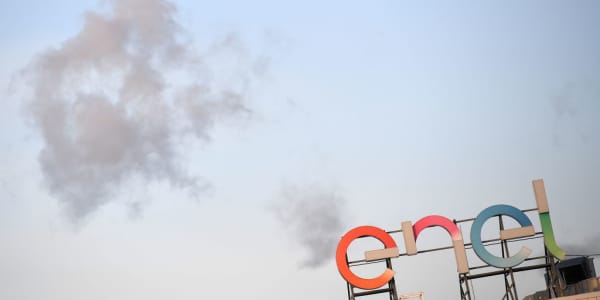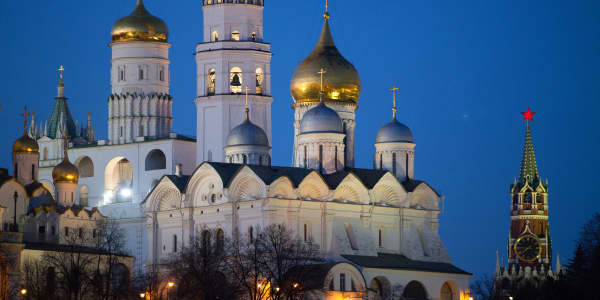International business leaders will be assembling in St. Petersburg in Russia for the country's annual economic forum this week amid hopes that the country can still rebuild its investment outlook and relationship with the rest of the world.
The three-day St. Petersburg International Economic Forum (SPIEF) starts on June 18 and comes at a difficult time for Russia. The country remains largely isolated on a political and economic level due to international sanctions on the country, imposed for Russia's perceived role in the pro-Russian uprising in Ukraine, which it denies.
Making matters worse in Ukraine, there has been an escalation of violence lately between pro-Russian rebels and the country's armed forces, threatening a fragile official ceasefire, called the Minsk agreements, and potentially earning Moscow an extension of sanctions until the end of the year.
Russia's economy has been on a roller-coaster ride since the conflict erupted in spring 2014 with its currency and stocks hit hard by declining oil prices, capital outflows and soaring inflation.
There are signs that the rate of inflation is slowing and the ruble has recovered some strength to trade around 55 to the dollar (from lows of around 70 in February) – factors which could buoy investor sentiment towards Russia.
SPIEF upbeat?
One economist said the recent recovery in Russian stocks and the ruble could make SPIEF more upbeat this year than last, when the U.S. discouraged business leaders from attending the summit.
"Many chief executives from large American and European companies have announced their attendance (this year) and the fact that not only the ruble, but Russian equities and bonds have rallied year to date giving the event a more upbeat backdrop," Marcus Svedberg, chief economist at East Capital, told CNBC.
"That parts of the Russian economy are still under sanctions is clearly negative, but analysts are now discussing when sanctions will be lifted rather than if there will be more sanctions, which is an important difference compared to last year," Svedberg added.
Read MoreRussia warns of 'new military confrontation' in Europe
Russia's poor economic growth outlook is top of the agenda for Russia's central bank. In April, Russia's gross domestic product (GDP) decreased by 4.2 percent compared to the same month in the previous year.
Reflecting concerns over growth, the central bank cut its key interest rate for the fourth consecutive month on Monday by 1 percentage point to 11.5 percent. In a statement, the bank said it was, "taking account of lower inflation risks and persistent risks of considerable economy cooling."
Risk aversion
Political risk has, unsurprisingly, put investors in Russia off putting their money into the country. Russia saw a net capital outflow in the first quarter of the year of $32.6 billion, central bank estimates showed. The country's decision to tighten regulations around its banking sector has also acted as a deterrent, another economist Steen Jakobsen noted.
Jakobsen, chief economist at Saxobank, said there was a "clear" aversion towards investing in Russia due to risk and regulations there.
"We've seen an aversion to doing business in Russia clearly, people are stepping back, but that is also partly due to the fact that Russia is becoming more discriminatory in terms of regulations and services. So there's some apprehension but it's a two-way street."
He noted, however, that Saxobank remained committed to Russia and was optimistic about its recovery in the long-term.
"You have to be optimistic about Russia overall, it's a nation that's used to facing headwinds. The sad thing is that we've engaged in a macro level, politician to politician war of words…but what we need to see is a gradual opening of business to business. The last time I flew to Moscow from London the plane was only 25 percent full and so clearly it's having an impact but everyone's a loser (in that situation)."
Read MoreIs Finland really getting ready for war with Russia?
Despite a recovery seen in Russian equities and the ruble, Svedberg conceded that some investors could decide not to return to Russia, "regardless what happens to sanctions or how the market performs."
More sanctions coming?
Following an escalation of violence in east Ukraine, European leaders are expected to renew economic sanctions on Russia when they meet at a European Council summit at the end of June.
On Thursday, the European Parliament passed a resolution calling on EU governments to maintain sanctions on Russia, signalling that they could be extended until the end of the year.
Read MoreHas Russia justearned itself more sanctions?
Saxobank's Jakobsen believed that anti-Russian rhetoric was unhelpful and that improving business ties could improve Russia's relations with the rest of the world.
"Problematically, Putin is getting a little bit more money coming in from higher energy prices at that moment so he's able to entrench his position further and Europe is taking the high ground. It also doesn't help that every world leader wants to shout from the rooftops how Putin and Russia is wrong," he added.
"We need to tone that down and get back to business to business and let business democratize Russia rather than trying to do it upfront."
- By CNBC's Holly Ellyatt, follow her on Twitter @HollyEllyatt.





